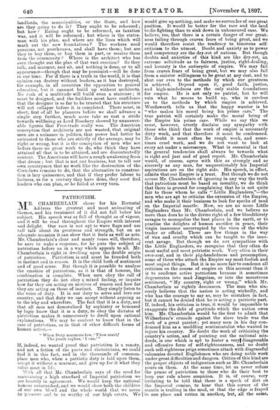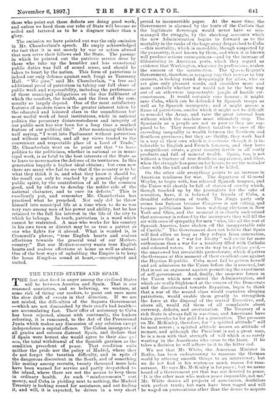PATRIOTISM.
it/ER. CHAMBERLAIN chose for his Rectorial Address the greatest and most animating of themes, and his treatment of it did not fall below his subject. His speech was as full of thought as of vigour, ;Ind it will be read throughout the Empire with interest and delight. Our race is not apt to wave flags and use tall talk about its greatness and strength, but on an adequate occasion it can show that it feels as well as acts. Mr. Chamberlain's clear and manly tones will, therefore, be sure to wake a response, for he puts the subject of patriotism before us in a way which appeals to all. Mr. Chamberlain is right in dwelling upon the double origin of patriotism. Patriotism is and must be founded both in instinct and in reason. It is the child both of sentiment and of good sense. But though it is possible to analyse -the emotion of patriotism, as it is that of honour, the combination is complete. When men obey the call of patriotism they do not obey a mixed feeling, or inquire how far they are acting on motives of reason and how far they are acting on those of instinct. They simply listen to the voice of duty. It is our duty to serve and love our country, and that duty we can accept without arguing as to the why and wherefore. The fact that it is a duty, and that all men not demoralised by sophistry or bemused by logic know that it is a duty, to obey the dictates of patriotism makes it unnecessary to dwell upon rational explanations. We may be content to know that in the case of patriotism, as in that of other difficult forms of human action,— " When Duty murmurs low, Thou must,' The youth replies, 'I can."
If, indeed, we wanted proof that patriotism is a reality, and not a fiction of the poets and rhetoricians, we could find it in this fact, and in the thousands of common- place men who, when a patriotic duty is laid upon them, accept it without a murmur, and give up for it what they value most in life.
With all that Mr. Chamberlain says of the need for maintaining a high standard of Imperial patriotism we are heartily in agreement. We would keep the national honour untarnished, and we would show both the children of our own blood and the whole world that we mean p:eserve awl to be worthy of our high estate. We would give up nothing, and make no surrender of our great position. It would be better for the race and the land to die fighting than to sink down in unhonoured ease. We believe, too, that there is a certain danger of our great- ness failing through craven fears of being great, and we would therefore resist the tendency to timorous self- criticism to the utmost. Doubt and anxiety as to power and competency are the dry-rot of nations. But though doubts and anxieties of this kind are like dry-rot, an extreme solicitude as to fairness, justice, right-dealing, and honesty is the antiseptic of empire. We may fail from craven fears of being great, but we may also fail from a sinister willingness to be great at any cost, and to shut our eves to the methods by which our greatness is achieved. Depend upon it, good faith, justice, and high-mindedness are the only stable foundations for empire. He is not only no patriot, but he will ruin what he means to build up, who is careless as to the methods by which empire is achieved. Wordsworth tells us that the happy warrior is he "who makes his moral being his prime care." The true patriot will certainly make the moral being of the Empire his prime care. While we say this we must, however, utterly disclaim any sympathy with those who think that the work of empire is necessarily dirty work, and that therefore it must be condemned. No doubt it must often be rough work, and some- times cruel work, and we do not want to look at every act under a microscope. What is essential is that the general tendencies shall always be towards what is right and just and of good report. Mr. Chamberlain would, of course, agree with this as strongly and as sincerely as any man, for unquestionably his Imperial aspirations are on the right side. His speech, in effect, admits that our Empire is a trust. But though we do not accuse Mr. Chamberlain of ignoring in any way the truth that patriotism must be based on morality, we do think that there is ground for complaining that he is not quite fair to those whom he calls "Little Englanders,"—the men who are apt to criticise the extension of the Empire, and who make it their business to look for specks of mud on the Imperial mantle. Now, we are no more Little Englanders than Mr. Chamberlain, and we believe no more than does he in the divine right of a few bloodthirsty savages to monopolise the best places in the earth, or to practise the delights of human sacrifice in peace, their virgin innocence uncorrupted by the vices of the white trader or official. There are few things in the way of vice and cruelty which can be taught to the inno- cent savage. But though we do not sympathise with the Little Englanders, we recognise that they often -do most useful and most patriotic work. Very often in their over-zeal, and in their pig-headedness and presumption, some of those who attack the Empire say most foolish and most unjust things. But it is no more fair to condemn all criticism on the course of empire on this account than it is to condemn active patriotism because it sometimes degenerates into mad Jingoism, or into the monstrous sentiment, "My country, right or wrong," which Mr. Chamberlain so rightly denounces. The man who sin- cerely believes that the nation is acting wickedly, and who has the courage to say so, may be mistaken in fact, but it cannot be denied that he is acting a patriotic part. If, indeed, his criticism is true, it would be impossible to exaggerate the debt of gratitude which the nation owes him. Mr. Chamberlain would be the first to admit that Wilberforse's: crusade against the slave trade was the work of a great patriot ; yet many men in his day con- demned him as a meddling sentimentalist who wanted to injure his country. No doubt the work of criticising the country's action, and of pointing out the national mis- deeds, is one which is apt to foster a veryl disagreeable and offensive form of self-righteousness, and no doubt such self-righteous prigs sometimes attack with disgraceful calumnies devoted Englishmen who are doing noble work under great difficulties and dangers. Critics of this kind are the proper objects of indignation such as Mr. Chamberlain pours on them. At the same time, let us never refuse the praise of patriotism to those who do their best to keep our rule above suspicion. It is, of course, very irritating to be told that there is a speck of dirt on the Imperial ermine, to hear that this corner of the mantle is trailing in the mud, or that the edge is frayed in one place and rotten in another, but, all the same, those who point out these defects are doing good work, and unless we heed them our robe of State will become so soiled and tattered as to be a disgrace rather than a glory.
The omission we have pointed out was the only omission in Mr. Chamberlain's speech. He amply acknowledged the fact that it is not merely by war or action abroad that men serve their fellows and the State. The passage in which he pointed out the patriotic service done by those who take up the humbler and less sensational public duties was full of sound sense, and should be taken to heart by the nation. This form of patriotism is indeed our only defence against such fungi as Tammany Hall. "We give," said Mr. Chamberlain, "a free and additional proof of patriotism in taking our full share of public work and responsibility, including the performance of those municipal obligations on the due fulfilment of which the comfort, the health, and the lives of the com- munity so largely depend. One of the most satisfactory features of modern times is the greater interest taken by the educated and leisured class in the unambitious but. most useful work of local institutions, while in national politics the pecuniary disinterestedness and integrity of our public men has now been for a long time a marked feature of our political life." After mentioning Gibbon's naïf saying, "I went into Parliament without patriotism and without ambition, and all my views tended to the convenient and respectable place of a Lord of Trade," Mr. Chamberlain went on to point out that "to leave politics to the politicians, whether in national or in muni- cipal work, is as fatal to the best interests of the State as to leave to mercenaries the defence of its territories. In this generation happily a higher ideal obtains ; but even now there are many who fail to see that if the country is to be what they think it is, and what they know it should be, the result can only be reached by a general display of public spirit, by the contribution of all to the common good, and by efforts to develop the nobler side of the national character, and to cure its defects." This is excellently put, and remember Mr. Chamberlain has practised what he preached. Not only did he throw himself into municipal life at a time when to do so was very rare among men of his power and ability, but he has retained to the full his interest in the life of the city to which he belongs. In truth, patriotism is a word which cannot be restricted. A man who works for his country in his own town or district may be as true a patriot as one who fights for it abroad. What is wanted is, in Cromwell's phrase, "true English hearts and zealous affections towards the general weal of our Mother- country." But our Mother-country wants true English hearts and zealous affections at home as well as abroad. One of the best ways of upholding the Empire is to keep the home Kingdom sound at heart,—uncorrupted and united.























































 Previous page
Previous page